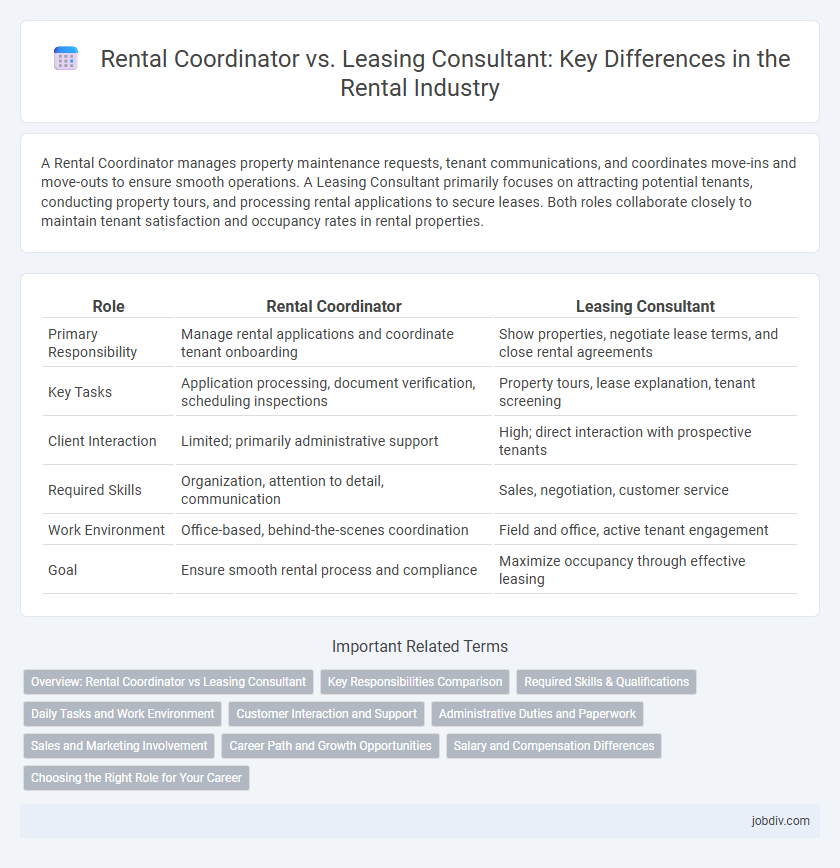A Rental Coordinator manages property maintenance requests, tenant communications, and coordinates move-ins and move-outs to ensure smooth operations. A Leasing Consultant primarily focuses on attracting potential tenants, conducting property tours, and processing rental applications to secure leases. Both roles collaborate closely to maintain tenant satisfaction and occupancy rates in rental properties.
Table of Comparison
| Role | Rental Coordinator | Leasing Consultant |
|---|---|---|
| Primary Responsibility | Manage rental applications and coordinate tenant onboarding | Show properties, negotiate lease terms, and close rental agreements |
| Key Tasks | Application processing, document verification, scheduling inspections | Property tours, lease explanation, tenant screening |
| Client Interaction | Limited; primarily administrative support | High; direct interaction with prospective tenants |
| Required Skills | Organization, attention to detail, communication | Sales, negotiation, customer service |
| Work Environment | Office-based, behind-the-scenes coordination | Field and office, active tenant engagement |
| Goal | Ensure smooth rental process and compliance | Maximize occupancy through effective leasing |
Overview: Rental Coordinator vs Leasing Consultant
A Rental Coordinator manages administrative tasks such as processing applications, coordinating maintenance requests, and ensuring tenant satisfaction, focusing on operational efficiency within rental properties. A Leasing Consultant primarily engages with prospective tenants by marketing rental units, conducting property tours, and facilitating lease agreements to maximize occupancy rates. Both roles collaborate closely but differ in their emphasis on tenant relations versus administrative coordination.
Key Responsibilities Comparison
Rental Coordinators manage the administrative tasks involved in property rentals, including application processing, tenant communication, and lease documentation preparation. Leasing Consultants focus on marketing rental properties, conducting property tours, and closing lease agreements with prospective tenants. Both roles require strong organizational skills but differ in their emphasis on operational management versus client interaction and sales.
Required Skills & Qualifications
Rental Coordinators need strong organizational skills, proficiency in property management software, and excellent communication abilities to coordinate maintenance requests and tenant interactions effectively. Leasing Consultants require in-depth knowledge of lease agreements, sales techniques, and customer service expertise to attract and secure qualified tenants. Both roles benefit from attention to detail, multitasking capabilities, and a thorough understanding of fair housing laws and rental market trends.
Daily Tasks and Work Environment
A Rental Coordinator manages tenant communications, processes rental applications, and coordinates maintenance requests, often working in property management offices with frequent phone and email interactions. Leasing Consultants focus on showing properties, explaining lease terms, and closing rental agreements, typically spending more time touring units and engaging directly with prospective tenants. Both roles require strong organizational skills and customer service, but Rental Coordinators operate in a more administrative environment while Leasing Consultants engage in face-to-face sales activities.
Customer Interaction and Support
Rental Coordinators manage customer interactions by handling inquiries, scheduling property viewings, and coordinating lease documentation to ensure a smooth rental process. Leasing Consultants provide personalized support by guiding prospective tenants through rental options, explaining lease terms, and addressing concerns to enhance customer satisfaction. Both roles emphasize effective communication, but Leasing Consultants typically engage more directly in tenant relationship building and negotiation.
Administrative Duties and Paperwork
Rental Coordinators primarily manage administrative duties such as processing applications, organizing lease documents, and maintaining records to ensure compliance and efficient workflow. Leasing Consultants focus more on client interactions but also handle essential paperwork including lease agreements, disclosures, and renewals to facilitate tenant onboarding and retention. Both roles require meticulous attention to detail and proficiency in property management software to streamline rental processes.
Sales and Marketing Involvement
Rental coordinators focus on managing rental agreements, tenant communications, and coordinating property maintenance, playing a supportive role in sales and marketing by facilitating smooth leasing transactions. Leasing consultants have a direct sales and marketing role, actively promoting properties, conducting tours, and driving tenant acquisition through persuasive communication and market analysis. Their involvement is crucial in attracting potential renters and closing leases, leveraging marketing strategies to meet occupancy goals.
Career Path and Growth Opportunities
Rental Coordinators primarily manage rental applications and tenant communications, serving as a foundational role with direct exposure to property management operations. Leasing Consultants advance by developing sales skills, handling lease agreements, and increasing resident retention, positioning themselves for supervisory roles or property management careers. Career growth for both roles often leads to higher management positions such as Property Manager or Regional Manager, with Leasing Consultants typically experiencing faster upward mobility due to their sales responsibilities.
Salary and Compensation Differences
Rental Coordinators typically earn an average salary ranging from $35,000 to $50,000 annually, with compensation packages often including bonuses based on performance metrics. Leasing Consultants, on the other hand, usually receive a base salary between $30,000 and $45,000, supplemented by commission incentives tied to lease signings and occupancy rates. Salary disparities reflect the differing responsibilities and sales targets, with Leasing Consultants benefiting more from commission-driven earnings while Rental Coordinators have steadier, salary-centric compensation.
Choosing the Right Role for Your Career
Choosing between a Rental Coordinator and a Leasing Consultant depends on your career goals and skill set. Rental Coordinators focus on managing rental applications, coordinating maintenance requests, and ensuring smooth tenant communications, making it ideal for those skilled in organization and property management. Leasing Consultants prioritize marketing rental properties, conducting tours, and closing lease agreements, suited for individuals with strong sales skills and customer service expertise.
Rental Coordinator vs Leasing Consultant Infographic

 jobdiv.com
jobdiv.com